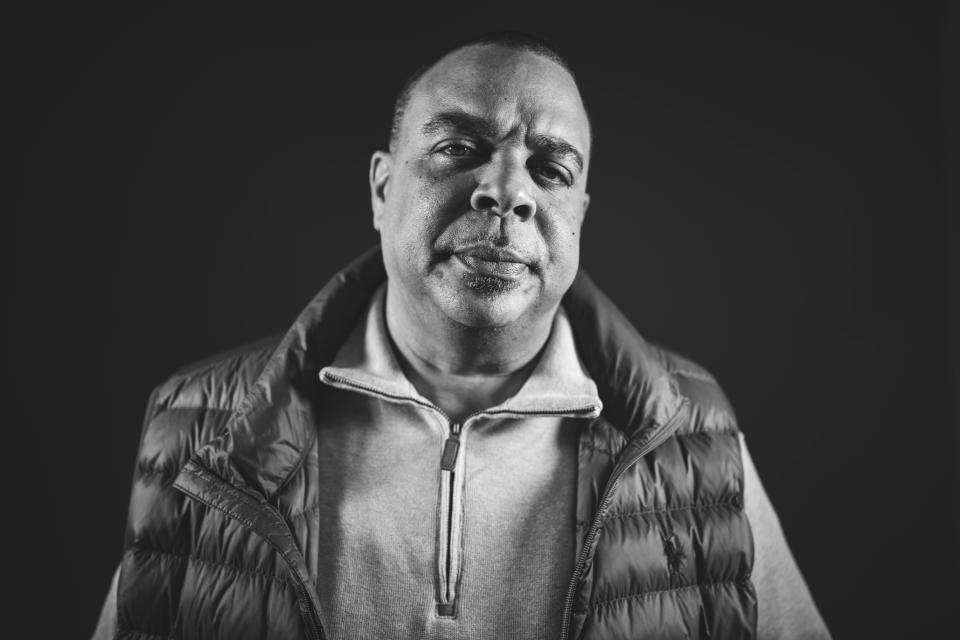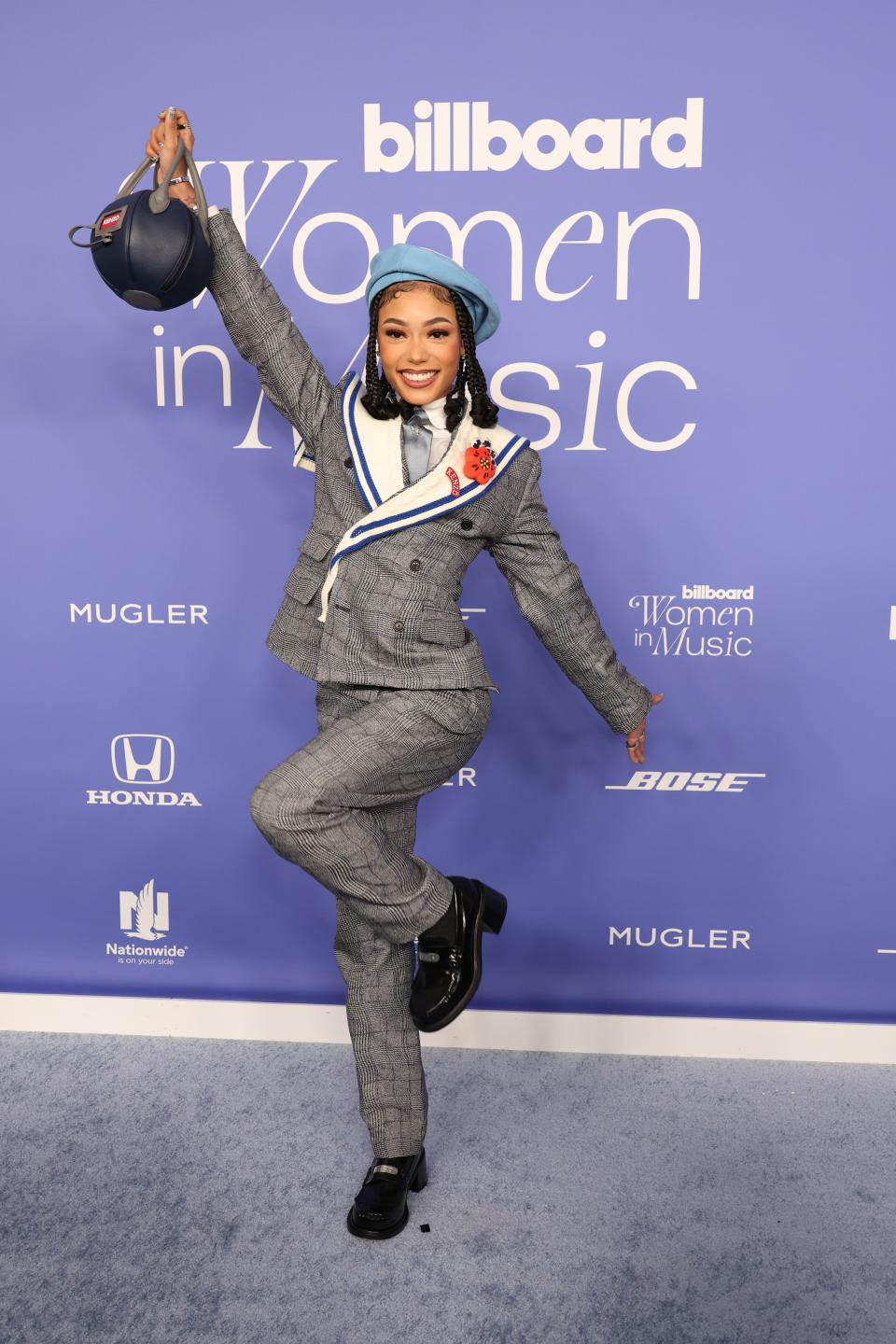Why are high energy, beat-driven rap records at America's pop forefront?
- Oops!Something went wrong.Please try again later.
- Oops!Something went wrong.Please try again later.
- Oops!Something went wrong.Please try again later.
Thirty-five years ago, Shawn Caesar, urban apparel retailer Downtown Locker Room's vice president of marketing, was a hip-hop and house music-loving Baltimore teenager who fervently believed that the intersection of the two genres was powerful enough to fuse a youth-driven cultural revolution.
Caesar, now in his 50s, has spent his entire adult life producing and promoting house music as the co-founder of Baltimore-based, club-friendly music label Unruly Records, plus working as an entrepreneur and party promoter responsible for maintaining the continued intersection of urban culture, house music and hip-hop swagger.
Sitting in a 33rd-floor lounge at Nashville's J.W. Marriott Hotel during May's Music Biz Conference, the fashion and music impresario is the best person to ask how and why house-inspired and club-ready beats — performed by hook-driven emcees like East Coast favorites Coi Leray and Ice Spice, Memphis-based NLE Choppa and others — have surged to the forefront of pop-driving hip-hop culture.

"Four decades of hit singles have proved that this isn't out of the question," Caesar tells The Tennessean.
In 1988, the Jungle Brothers' dance-driven "I'll House You" was remixed by Chicago house icon Todd Terry and hit the Top 20 on Billboard's Hot Rap Singles chart. Two years later, "Poison" by Bell Biv DeVoe was one of Billboard's Top 5 songs of the year.
By 2009, the style had largely fallen out of vogue in North America. Then the internet's surge — and online-scouring European producers discovering '90s American hits from East Coast cities like Baltimore, Newark and Philadelphia — caused a resurgence in house-flavored beats among independent rappers wanting to merge their online-first fanbases with fresh beats like Kanye West and Kid Cudi.
Italian production tandem Crookers remixed Cudi's "Day N Nite" in a manner consistent with techniques familiar to the likes of Caesar. Moreover, West added vocals to a remix of "I'm the S---," initially an Unruly-released single by Baltimore producer DJ Class.
Cudi's remixed single became a top-five all-genre pop hit, while "I'm The S---" matched the level of success of "I'll House You" from a quarter-century prior.
In 2023, New York-based Ice Spice has achieved a half-year surge, from breaking into Billboard's all-genre Hot 100 chart to currently almost dominating it. Similarly, Boston-born Leray's single "Players" is a viral-to-real-time hit. Moreover, on the back of New Jersey-based producer Fya Man, Memphis-based emcee NLE Choppa's October 2022 release "Do It Again" has also charted.
The club-ready, East Coast-driven, house-to-hip-hop movement is gaining national momentum.
Over four decades, Caesar's Downtown Locker Room has grown from a Mid-Atlantic-based lifestyle retailer providing one-stop shopping for street-inspired footwear, apparel and accessories to young, trendsetting multicultural audiences into being part of a conglomerate operating 247 stores across 19 states across the United States.
For online-obsessed audiences between the xennial to zoomer generations (1980-2010), stores like DTLR have served as real-time communal hubs for cultural exchange and promotion via streetwear staples like the more affordable versions of the puffy winter jackets, skinny jeans, hooded sweatshirts, velour sweat suits, leggings, blinged-out belts and various Nike sneaker styles that Ice Spice wears in her music videos.
Caesar notes that DTLR's "urban legitimacy" comes from the stores keeping a steady supply in-store of street, virally popular music, plus, since 1997, the latest in clothes popular in hip-hop culture.
"Music and lifestyle, regardless of genre or culture, have always been intertwined," he says, "and when cultures intertwine, they organically create central spaces. Doubling down on the fact that those cultures were converging on retail spaces in urban communities has allowed the culture that birthed the Ice Spices and Coi Lerays of the world to exist."
Similar to the turn of the 2010s, digital-led globalization of the rap-meets-dance space played a vital role in keying explosive success.
Atlanta-borne trap rhythms and Chicago-style drill beats moving at 70 beats per minute have become popular in the United Kingdom, where 140 BPM drum and bass music has been popular for three decades. In addition, double-timing drill and trap beats created songs popular in the world's rap culture, which migrated to North America via Canadian rapper Drake's prolonged adoration of British-based rap.
Merge Drake's hip-hop-to-pop ubiquity with East Coast locales where centralized urban culture long familiar with house-aimed rap could synthesize the influences into palatable songs.
Caesar describes this emerging rap sound evolving to NLE Choppa's "Do It Again," sampling Rose Royce's 1978 classic "Love Don't Live Here" to Ice Spice's sensual single "Princess Diana" and "Barbie" film soundtrack remake of Aqua's 25-year-old hit "Barbie Girl" featuring female rap star Nicki Minaj as emblematic of how "on fire" the style has become.
In his mind, it's the fact that the subgenre has always seen, but not readily recognized, female vocalists that is problematic — but is also leading to its current success.
Simultaneous to the success of the Jungle Brothers' "I'll House You" back in Baltimore, Tony Boston, a sassy, 6-foot tall, 350-pound drag queen who performed as Miss Tony, released 1994's "Whatzup? Whatzup?" The track was produced by the Underground Trak Team — the duo of Caesar and his longtime business associate Scott "Scottie B" Rice.
The song was a minor regional radio hit that still resonates in East Coast club circles because the aggressive vocal samples over wildly warped drum loops are instantaneously catchy and danceable.
A decade later, the late Baltimore club and radio DJ K-Swift's emergence, plus Baltimore native Ryeisha "Rye Rye" Berrain's club-ready rap tracks "Shake It to the Ground" and "Wassup Wassup" were popular. The latter's music was released to massive internet acclaim but has only achieved more extended cultural resonance via a manner similar to "Whatzup? Whatzup?"
Fast-forward another 15 years and TikTok's emergence as a portal that reduces songs to ear-warming, beat-driven 15-second loops has emerged alongside Drake's love of drill and a world where streetwear and street culture — due to the 18-month COVID-19 lockdown — remain frozen in time and, thus, more recognizable than ever as cultural touchstones.
Listen to Ice Spice's "Bikini Bottom" and the self-empowering question "How can I lose if I'm already chose?" becomes an instantaneous loop. The same goes for Leray's "Players," which advocates that "girls are players, too," in a manner — similar to Miss Tony and Rye Rye — most sassy regarding the benefits of female promiscuity.
Even deeper, listen to NLE Choppa's "Do It Again" and the enrapturing melodic swirl of Rose Royce lead singer Gwen Dickey's voice alongside NLE Choppa's hard-edged rap bars creates an unmistakable sound. Moreover, "Boy's A Liar, Pt. 2," Ice Spice's duet with U.K.-based Pink Pantheress, is built around the latter's lilting falsetto warping around drum loops and rap verses to create a seemingly ethereal groove.
Despite the recent acclaim the style has achieved, virally beloved and club-ready modern hip-hop has yet to achieve Billboard all-genre Hot 100 success. However, DTLR's Caesar doesn't believe that the subgenre needs a new style of custom Nike Air Max sneakers to take it to the next level.

"Trying to make tracks that don't reflect pop trends and slick production, but rather whatever the street-level party needs — the loudest, most distorted drum loops possible for the most oversized speakers in the world and raw, yet accessible vocals might be exactly that — I'm not entirely sure."
He continues with a forward-thinking proposition.
"Almost 40 years ago, my friends and I were right to believe that this culture could grow into an international mainstream pop phenomenon. So I'm excited for what's next."
This article originally appeared on Nashville Tennessean: House music surges to the forefront of pop-driving hip-hop culture

